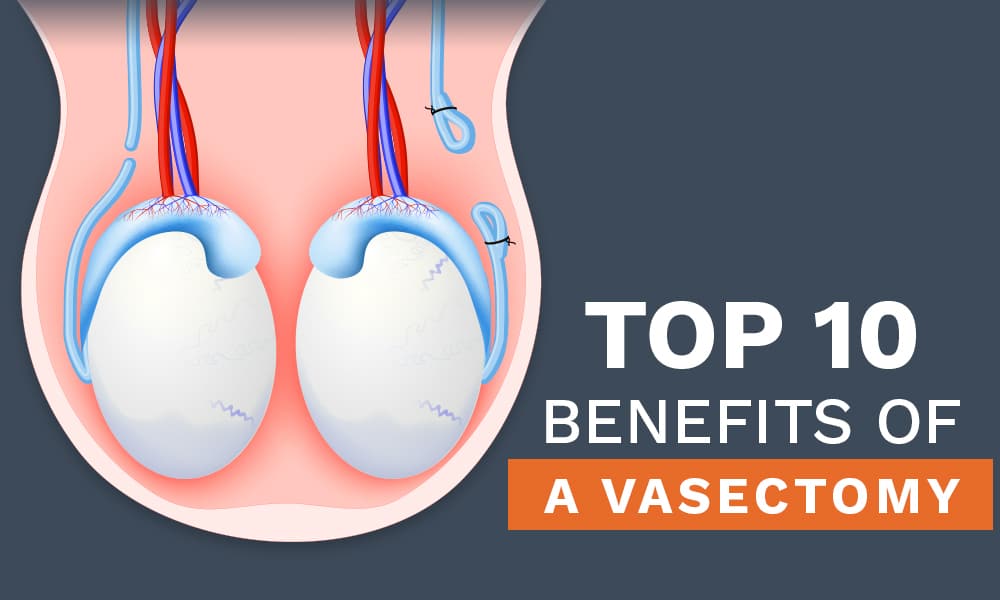The Health Benefits of Vasectomy
In the realm of reproductive choices, vasectomy emerges not only as a reliable contraceptive method but surprisingly, as a contributor to overall well-being. In this exploration, we delve beyond the conventional understanding of vasectomy to unravel the unexpected health benefits that accompany this decision.
Reduced Risk of Prostate Cancer:
Recent studies have hinted at a potential correlation between vasectomy and a decreased risk of prostate cancer. While further research is needed, the intriguing possibility of a protective effect adds a layer of significance to this common male sterilization procedure. Let’s navigate the nuances of vasectomy and its potential impact on prostate health.

Cardiovascular Health Impact:
Beyond its role in family planning, vasectomy may have implications for cardiovascular health. While not commonly discussed, some studies suggest a connection between vasectomy and a potential reduction in cardiovascular risks. We dive into the evolving landscape of research to understand how this seemingly straightforward procedure might offer unexpected benefits for the heart.
Psychological Well-Being After Vasectomy:
Contrary to prevalent concerns, undergoing a vasectomy can contribute to positive psychological well-being. The relief from the fear of unintended pregnancies often results in reduced stress and an improved mental state. Let’s explore the emotional side of vasectomy and how it can positively influence overall mental health.
Pain and Discomfort Reduction:
Addressing common misconceptions, it’s crucial to recognize that vasectomy is a minimally invasive procedure with a relatively straightforward recovery process. Contrary to fears of prolonged pain and discomfort, most men experience only mild and temporary discomfort post-vasectomy. Understanding the reality of the recovery period contributes to dispelling myths and encourages individuals to consider the long-term benefits over short-term concerns.
Sexual Satisfaction and Vasectomy:
The impact of vasectomy on sexual satisfaction and intimacy is a facet often overlooked. With the removal of concerns about unintended pregnancies, couples often report an enhanced sense of freedom and intimacy. This section explores the positive effects of vasectomy on sexual relationships, emphasizing the potential for a more fulfilling and stress-free sexual experience.
Hormonal Balance Post-Vasectomy:
While vasectomy is not directly tied to hormonal changes, its indirect influence on hormonal balance is worth exploring. The absence of sperm in ejaculation does not affect the production of hormones, ensuring that essential hormonal functions remain intact. Understanding this aspect is crucial in presenting a holistic view of vasectomy’s impact on the male reproductive system.
Vasectomy and Long-Term Health:
Contrary to common misconceptions, vasectomy does not pose a threat to long-term health. The procedure’s simplicity and effectiveness contribute to its safety. We’ll address concerns about potential long-term health risks, providing evidence-backed information to alleviate anxieties and guide individuals toward informed decision-making.
Addressing Common Concerns:
This section aims to address and debunk common concerns and myths surrounding vasectomy. By providing factual information and dispelling misconceptions, we empower individuals to make decisions based on accurate knowledge rather than unfounded fears. Addressing concerns comprehensively enhances the overall understanding of vasectomy as a safe and beneficial procedure.
Frequently Asked Questions About the Health Benefits of Vasectomy
1. Q: What is vasectomy, and how does it work as a contraceptive method?
A: Vasectomy is a minor surgical procedure that involves cutting or blocking the vas deferens, preventing the release of sperm during ejaculation. It serves as a highly effective form of permanent contraception.
2. Q: Is there a link between vasectomy and a reduced risk of prostate cancer?
A: Emerging research suggests a potential association between vasectomy and a lower risk of prostate cancer. While further studies are needed, the topic is actively explored for its implications on men’s health.
3. Q: Can vasectomy impact cardiovascular health positively?
A: Some studies indicate a potential connection between vasectomy and a reduction in cardiovascular risks. However, this area of research is still evolving, and more investigations are necessary.
4. Q: Does vasectomy have psychological benefits?
A: Yes, vasectomy can positively impact psychological well-being. The removal of concerns about unintended pregnancies often leads to reduced stress and improved mental health.
5. Q: Is there any pain or discomfort associated with vasectomy?
A: While some men may experience mild and temporary discomfort, vasectomy is generally a minimally invasive procedure with a straightforward recovery process.
6. Q: How does vasectomy affect sexual satisfaction and intimacy?
A: Vasectomy can enhance sexual satisfaction and intimacy by removing concerns about unintended pregnancies, allowing couples to experience a more relaxed and fulfilling sexual relationship.
7. Q: Does vasectomy impact hormonal balance?
A: Vasectomy does not directly affect hormonal balance. The absence of sperm in ejaculate does not interfere with the production of hormones, ensuring essential hormonal functions remain unaffected.
8. Q: Are there long-term health risks associated with vasectomy?
A: Vasectomy is considered a safe and low-risk procedure. This section addresses common concerns and provides evidence-backed information to dispel myths about long-term health risks.
9. Q: Can a vasectomy be reversed if desired later on?
A: While vasectomy reversal is possible, it’s not guaranteed to restore fertility. Individuals considering a vasectomy should approach it as a permanent contraceptive method.
10. Q: What are common misconceptions about vasectomy, and how can they be addressed?
A: This section aims to debunk common myths and misconceptions surrounding vasectomy, offering accurate information to empower individuals in making informed decisions.
Conclusion:
In conclusion, vasectomy emerges not only as an effective family planning method but as a choice that offers unexpected health benefits. From potential reductions in prostate cancer risk to positive effects on mental well-being and sexual satisfaction, vasectomy presents a multifaceted approach to male reproductive health.




